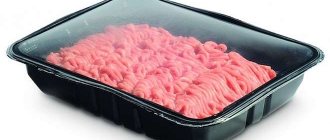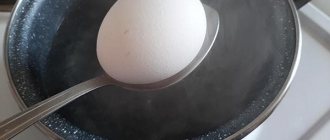In addition to the usual use of egg whites immediately before eating or for preparing various dishes, sometimes it becomes necessary to ensure its storage for a while.
Considering that protein without shell protection is a perishable product, you should know under what conditions and for how long it remains suitable for consumption.
We will tell you further how long egg whites can be stored in the refrigerator.
Under what conditions should it be stored?
The best way to preserve eggs is to make them “untouchable”, that is, leave them in an intact shell at a temperature of +2°C -+4°C for 4 weeks from the moment they are born. If the integrity of the shell is compromised, the shelf life of the whites will be reduced to 5 days, even if they are separated from the yolks and are under normal storage conditions.
Storing proteins in the refrigerator or freezer is the safest way. But in this case, much will depend on their type (fresh, whipped with or without sugar, boiled).
Signs of spoiled egg whites
You can determine that a product has deteriorated by the following signs:
- Unpleasant rotten smell.
- Delamination into individual components.
- Formation of clots resembling threads or fabric fibers.
- The color became cloudy, smoky.
- A crust appeared on the surface.
- Drying.
Spoiled proteins should not be eaten or given to pets. They quickly develop pathogenic microorganisms, the entry of which into the body leads to severe poisoning. This product must be discarded immediately. You should not leave missing whites in the refrigerator, as this can lead to bacterial damage to other products.
Outside the refrigerator
Storing fresh proteins at room temperature cannot last long. They dry out quickly and lose quality. But the product can “hold out” for 1 - 2 hours if it is well closed. It is important to protect it from light so that it does not deteriorate.
It is also possible to store chicken protein in the basement, where it can safely be stored for 1 - 3 days at temperatures up to +6°C without loss of quality.
What affects shelf life
The safety of egg whites depends on the following factors:
- Freshness and quality of the product . Proteins with expiration dates and defects spoil faster.
- Temperature . The lower, the longer they are stored.
- Humidity . In a dry place they deteriorate faster due to drying out.
- State . Fresh, boiled and whipped egg whites are stored for different times and under different conditions.
- Illumination . Sunlight accelerates drying and decomposition.
In the cold
How long you can store proteins in the refrigerator depends on how they will be preserved.
- If you keep them tightly closed, the shelf life of the product will be 3 - 5 days.
- When opened, this time is reduced to 2 days.
But nevertheless, everything will depend on the degree of freshness of the eggs and how carefully the product was separated from the yolk.
You can store proteins in the refrigerator without special preparation. At the same time, for storage it is allowed to combine unused products from different eggs.
It is not advisable to place a container on the refrigerator door. It is warmer there than on the shelf, and in addition, there are constant temperature changes every time the door is opened.
It is best if proteins are stored in the refrigerator on the top shelf.
How long can it be stored?
The shelf life of egg whites depends on a combination of factors that provide the product with comfortable conditions under which it does not spoil.
The shelf life is affected by several indicators:
- How fresh and high quality the product was at the time of storage. If the shelf life of a whole egg expires or its shell has been damaged, then the protein extracted from it cannot be stored for long.
- Temperature conditions. At low, but not sub-zero, temperatures, protein products are stored longer.
- Humidity. In dry air, the product quickly dries out and deteriorates.
- The influence of light. Exposure to sunlight leads to rapid drying and spoilage of products.
In addition to the listed factors, the state of the protein mass at the time of storage is of significant importance.
For fresh, boiled and whipped proteins, different storage periods are allowed, subject to special conditions. According to GOST and SanPiN recommendations, the shelf life of whole eggs is 30 days at a positive temperature of no higher than 5-6°. For damaged shells – no more than 5 days. As for proteins removed from the shell, the requirements for their storage differ significantly.
In room conditions
Raw egg whites should not be stored at room temperature at all. They lose their taste, absorb smell and dry out , which leads to the rapid spread of pathogenic agents.
Raw protein mass without refrigeration remains suitable for no more than 2 hours. In this case, it must be placed in a container with a tight-fitting lid.
It is advisable to use dark glass or ceramic dishes . If you place the protein in the basement, where the same temperature is maintained (no higher than 6°), then its storage can last 2 days.
In the refrigerator
The best place for storage is a refrigeration unit, which maintains an optimal temperature of 4 to 6 degrees Celsius.
In this case, you should pay attention to some storage nuances that affect the shelf life of the product:
- in a sealed container, the whites will remain edible for 3-5 days;
- a product kept uncovered cannot be stored even in the refrigerator for more than 2 days;
- in close proximity to products with a strong odor, the protein will absorb them and lose its taste;
- next to meat and fish dishes, the product will deteriorate faster.
It should be noted that proteins cannot be stored in the refrigerator door, where warm air penetrates every time it is opened. The best option is the back wall on the top shelf of the refrigerator.
Raw whipped
Whipped whites cannot be stored. This does not make sense, since the air mass obtained during the beating process falls off during storage. During shock freezing, the airiness will remain, but during defrosting it will still decrease.
Boiled
protein that has undergone heat treatment within 3 days , provided that the product has been placed in a refrigerator.
You cannot store boiled squirrel in the refrigerator door, as due to temperature fluctuations the product will spoil very quickly. Therefore, its place is on the shelf.
It is not advisable to freeze boiled protein. After defrosting, it loses its taste, becomes loose, and does not hold its shape. But frozen boiled protein is quite suitable for making salads.
Freezing
The longest storage of proteins will be in a frozen state. The shelf life of the product will be 3 - 6 months.
Freezing should take place in food containers or ice trays, and when the mass freezes, it is transferred to a tight plastic bag and continued storage in the freezer.
When freezing several products in one container, you should indicate their quantity on a sticker and attach it to the container. This must be done so as not to subsequently have to deal with tedious calculations based on the average mass of one protein (35 grams).
Proteins cannot be frozen a second time. This must be taken into account when forming portions. And you can beat a defrosted product in the same way as a fresh one.
Signs of damage
The spoilage of a product can be judged by several characteristic signs. The most expressive of them:
- the appearance of a sharp musty odor;
- violation of the structure;
- the appearance of thread-like clots and fibers;
- cloudiness of transparency;
- the appearance of dark spots;
- a decrease in volume indicating drying.
The detection of the mentioned signs indicates the unsuitability of the product for human and animal consumption. The proliferation of pathogenic agents in such a protein occurs rapidly, which causes the risk of severe poisoning.
Spoiled egg whites should not be kept in the refrigerator. This causes contamination of nearby products by pathogenic microorganisms.
Whipped with sugar
It happens that during preparation you have to urgently leave. The question immediately arises: is it possible to store egg whites whipped with sugar?
If such a situation occurs, the product is not covered very tightly and placed on the refrigerator shelf. At the same time, you should not transfer it to another container, so as not to disturb the original structure.
The shelf life of egg whites whipped with sugar will depend on their quality. To get stable foam, you should:
- cool the product before whipping;
- add a little salt;
- use suitable utensils (copper is best).
Not everyone has a copper container on their household, so as an option you can use glass or metal containers. But you should absolutely not use aluminum cookware. This metal reacts with proteins, after which they turn gray.
Whipping chicken protein in a plastic container is contraindicated due to the formation of a film. In such dishes, the foam cannot become voluminous.
How to understand that a product is spoiled
Even a seemingly benign product can be hazardous to health. The microflora that multiplies in it does not always change the organoleptic properties (color, smell, consistency).
In production they use stickers, which necessarily indicate not only the date, but also the time. At home, you should carefully monitor the timing.
It is important to know!
Even if the product looks ordinary, don't take risks. After the expiration date, discard it.
How to determine freshness?
At home:
- Place in a container with water. This method will show:
- lies horizontally on the bottom - fresh;
- “stood up” vertically - the chicken laid it about a week ago;
- “hangs” in the water with the blunt end up - the egg is about twenty days old;
- surfaced - alas, it went rotten.
- With the help of light. Bring the egg to a powerful lamp or to a window if the sun is shining brightly. We are looking for signs of damage:
- spots appeared on the back of the shell;
- illuminates the embryo;
- the yolk has “dried” to the wall.
- Break an egg:
- an unpleasant odor will indicate that the product is spoiled;
- if the white is thick and does not spread on the plate, then the egg is fresh;
- a cloudy white, opaque protein indicates freshness - carbon dioxide has not yet had time to evaporate through the pores of the shell.
Important. The buyer has the right to demand replacement eggs or a refund from the store if it turns out that they purchased a damaged product. This is stated in Article 18 of the Law “On Protection of Consumer Rights”.
We invite you to watch a video on how to check the freshness of eggs at home:
Dry proteins
Dehydrated chicken egg white (albumin) is used in the same recipes as regular egg white. But it can be stored much longer than raw. The opened package is placed in a dark, dry place, and the product will be suitable at room temperature for about a year. Sealed packaging can be stored for several years.
Chicken egg white is a very valuable product that is widely used in cooking. It can be stored in various convenient ways without losing the quality of its composition and nutritional properties. But for this you need to know the storage conditions.
How many days does Meringue roll last?
Store the roll in the refrigerator for 2-3 days maximum (if this is possible at all). It does not need an airtight container, otherwise the crust will stop crisping.
Interesting materials:
What emotions can you show on your face? What deserts are there in the world? What factors influence the climate of Central Asia? What factors influence the quality of consumer goods? What factors influence the development of agriculture? What factors influence the educational potential of a family? What Marvel movies are still coming out? What films were filmed in Tutaev? What films are worth watching again? What films will be released in October November 2022?
What does it depend on?
If stored incorrectly, eggs may age, shrink, and become infected with bacteria. Therefore, we pay attention to the appearance, labeling and packaging.
According to current Russian standards, eggs are stamped with a harmless dye and packaged by type and category.
Markings are letters and numbers in red or blue on each egg. The first sign indicates the permissible storage period:
- “D” - “dietary”;
- "C" - "dining room".
Another sign indicates the category of the egg and is measured in grams:
- Third (3) - from 35 to 45.
- Second (2) - from 45 to 55.
- The first (1) is from 55 to 65.
- Selected egg (O) - from 65 to 75.
- Highest (B) - 75 or more.
The dietary ones indicate the date and month of sorting, but the quail ones are not marked. According to the standards, it is allowed not to label eggs, provided that information is indicated on the container and it is sealed with a label that breaks when the consumer container is opened.
Packaging plays an important role. The material must be approved for contact with food, undamaged, clean, dry and free of foreign odors - this ensures quality.
A good option is a cardboard container. This method will protect the product from foreign odors and maintain the necessary humidity.
Useful tips
To enjoy the taste of pasteurized milk, you need to follow simple rules for selection and storage. Among them:
- When purchasing pasteurized milk, you should always look at the label: check the expiration date, read the labeling.
- The labeling must indicate: composition, nutritional value of the product, information about the manufacturer.
- The packaging must be sealed and in no case damaged or swollen.
- It is better to choose opaque packaging, so the milk retains its taste properties well.
- Opened packaging is stored in the refrigerator regardless of the type of container.
- There is no point in boiling industrially produced milk - it has already undergone heat treatment.
- Milk absorbs foreign odors well, so it should be kept covered in the refrigerator.
- Storing in direct sunlight quickly renders the product unusable.
- Milk that is slightly sour or has expired can be used for baking.
What you need to know before use
Everyone knows that eggs are not a long-lasting product and that without refrigeration they quickly deteriorate. However, there are many little-known factors that can influence changes in the taste of a laying hen's gift even in the refrigerator. Most housewives do not even suspect that the product, although not alive, can nevertheless breathe.
The shell appears impenetrable, but in fact it contains several thousand microscopic pores. But each has a protective layer that allows only air to enter and traps microorganisms that can spoil the fresh product. This does not depend on the color of the shell.
The color of the outer shell depends only on the breed of chickens. But the truth is that brown eggs have thicker shells. Due to their thickness, they have a longer shelf life, they withstand transportation better without developing microcracks. But it is in brown areas that blood stains occur more often.
These alarming inclusions do not affect the taste and health in any way. The danger comes from the blood ring in the yolk. Its presence signifies the beginning of embryonic development, which was stopped for unknown reasons. Cocos with such dead embryos must be thrown away.
Checking freshness
When purchasing eggs in a store, you should always check their labeling. If it is not on each individual unit of goods, the general packaging does not include a manufacturing date. Sometimes, when buying eggs, doubts arise about their freshness.
In this case, before you break them up for cooking, you need to do a simple test by putting them in water one at a time. Very fresh ones, demolished less than a week ago, should sink to the bottom and lay horizontally there.
With a longer storage period, the moisture inside the egg seems to dry out. The vacated space is filled with air, forming a bubble. Therefore, the blunt end rises in the water. Having stopped in the water in the middle, the egg is still quite suitable for consumption, but it cannot be called fresh.
Photo: https://i.pinimg.com/originals/ee/0c/82/ee0c8247a2ac2752890f19c49804e2ca.jpg
Anything that floats to the surface is not suitable for food and must be thrown away. You can also check the freshness visually by breaking and releasing the coco into a saucer. In a fresh product, the protein will be slightly cloudy due to the accumulation of carbon dioxide bubbles. Over time, as the gas evaporates, it will become clear. Darkened protein with an unpleasant odor means a spoiled product.










